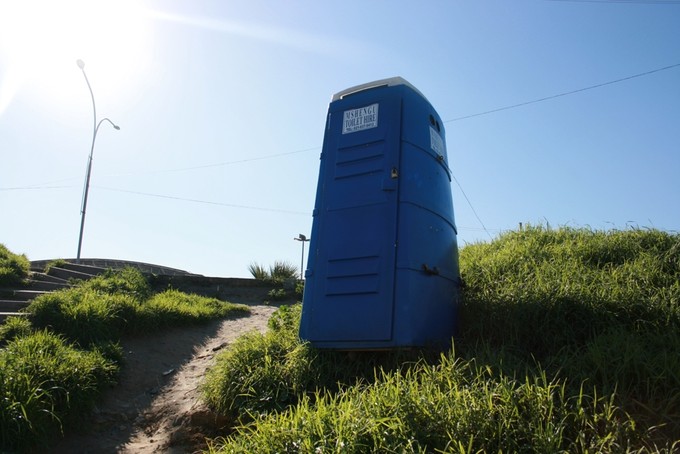

The Social justice Coalition has been campaigning for better sanitation in Khayelitsha, highlighting that outdoor toilets leave residents at risk of attack. Archive photo: Amelia Earnest (2013)
19 December 2017
Judgment in the Sinoxolo Mafevuka case was handed down in the Western Cape High Court on Monday, 18 December 2017.
Judge Tashwell Papier found both the accused Xolisa and Athabile Mafilika (Mafilika cousins) not guilty of rape and murder. Sinoxolo Mafevuka was found raped and murdered on 2 March 2015 in SST, Town Two Community, Khayelitsha. The two accused are the cousins of her boyfriend at the time of her death.
Sinoxolo Mafevuka left her home after 7pm on the evening of 1 March 2015. She was going to use the communal toilet about 200 metres away. She left never came back. Her family assumed that Sinoxolo had visited or slept over at her boyfriend’s place. She was 19 when she died.
In his judgment, Papier noted that the state presented no direct evidence linking the accused to the crime scene. The arrest, charge and detention of the accused was based on circumstantial evidence. The state drew inferences of guilt and could not connect the accused to the rape and murder of Mafevuka.
Papier noted the testimony of a Tygerberg Hospital doctor that examined Mafevuka’s body and found that she had been raped and strangled. But the fingerprints and DNA of the accused were not found on Sinoxolo’s body and clothes. But the judge criticised the examining doctor as well as the SAPS investigating officer for not determining the time of death.
Papier also criticised the investigating officer who was removed ten days after the the crime. This officer did not file his notes after interviewing the accused, forgot where he placed his notebook, contradicted himself in court and could not remember reading the accused their rights.
The judge also found that the state witnesses were not convincing and presented contradictory testimonies. Also the girlfriend of one of the accused corroborated their alibi.
Addressing the Mafevuka family Papier said “The Court is very sympathetic towards the Mafevuka family.” But he found that the court must apply the law fairly and the state must prove its case beyond reasonable doubt.
Mafevuka’s case has been highlighted by the Social Justice Coalition (SJC) as an example of the dangers facing people in informal settlements when they use outdoor toilets. The SJC is campaigning for better sanitation in informal settlements.
The judgment left the Mafevuka family and their many supporters stunned, disappointed and emotional. Mafevuka’s mother cried. Her screams reverberated across the courtroom.
The SJC sent a written response to GroundUp:
“It is clear from the reasons furnished that the detective services in the South African Police Service failed in their duty to secure credible evidence to secure a conviction and ultimately justice for Sinoxolo and her family. The first investigating officer assigned to the case failed in his duties in numerous ways. Despite being replaced as the investigating officer after pressure from the SJC, the public and unfavourable reporting in the media, the damage had been done. Credible evidence had been lost and poor records had been kept.It is now almost entirely unlikely that justice for Sinoxolo and her family will be realised. In addition two young men, now found to be not guilty, have served 20 months behind bars. This is a tragic outcome that can only contribute to a further undermining of trust between the police service and members of the community.”